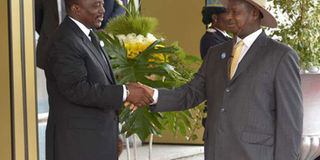Despite advances, democracy in Africa hobbled by ‘rigging’

President Yoweri Museveni of Uganda (right) welcomed by Joseph Kabila of DRC at CITE'DE 1UA l for the opening of the 17th COMESA summit of heads of State and Government of COMESA AT CITE'. PHOTO | AFP
What you need to know:
- Around 20 presidential elections have been held across the continent since 2015, with questions hanging over half of them.
- Burkina Faso has also lived through a period of major instability, with a coup overthrowing longtime strongman Blaise Compaore in October 2014.
- Nonetheless, Nigeria managed a smooth electoral handover of power as did neighbouring Benin, where the loser immediately congratulated newly elected leader, Patrice Talon.
- According to the annual Economist intelligence unit rankings, only nine sub-Saharan countries could be considered “democratic”: Botswana, Cape Verde, Ghana, Mauritius, Zambia, Lesotho, Namibia, Senegal and South Africa.
PARIS
In Africa, military coups and election violence are becoming rarer but poll rigging and manipulation remain rife, hobbling the continent’s democratic progress, experts say.
“We have this paradox where the number of elections is increasing but their quality is decreasing,” said Nic Cheeseman, an associate professor of African studies at Oxford University.
“Leaders are becoming more and more aware of how they can rig elections, and they are better and smarter at doing it,” said the founder of journal African Affairs and author of Democracy in Africa.
Around 20 presidential elections have been held across the continent since 2015, with questions hanging over half of them.
In contrast with the bloody post-election crises in Kenya (2007) and Cote d’Ivoire (2010) in which thousands died, “there have been some advances as there has been no election violence, even though results have been contested,” said Malian general Siaka Sangare, an electoral expert with the International Organisation of La Francophonie.
“But there are big challenges” still, he admitted.
Clashes left 17 dead in Congo Brazzaville after the disputed re-election of veteran leader Denis Sassou Nguesso in April, and Burundi has been mired in violence since President Pierre Nkurunziza won a controversial third term last July.
Burkina Faso has also lived through a period of major instability, with a coup overthrowing longtime strongman Blaise Compaore in October 2014.
Its transition government managed to survive another putsch before Roch Marc Christian Kabore was finally elected president.
Nonetheless, Africa’s most populous country, Nigeria, managed a smooth electoral handover of power as did neighbouring Benin, where the loser immediately congratulated newly elected leader, Patrice Talon.
In terms of democratic progress, “we need to move away from thinking about Africa to thinking about maybe two or three or four Africas,” Cheeseman said.
According to the annual Economist intelligence unit rankings, last year only nine sub-Saharan countries could be considered “democratic”: Botswana, Cape Verde, Ghana, Mauritius, Zambia, Lesotho, Namibia, Senegal and South Africa.
More than a dozen others were said to be semi-democratic while more than 20 regimes were classified as “authoritarian”.
In these countries, with little in the way of opposition or checks and balances, leaders were able to use state institutions to cement their power.
PROLONG MANDATE
“As time has gone on some heads of state have learned how to manage the ‘democratic theatre’ of elections, and they have dug themselves and their clans into power,” said Antoine Glaser, a French Africa expert.
Among the most immoveable is Sassou Nguesso, who has now led the Republic of Congo for 32 years. He took 60 percent of the vote in the first round of the election in March, which the opposition branded an “abuse of the system”.
In Equatorial Guinea, Teodoro Obiang Nguema, who came to power in a coup in 1979, was “re-elected” in April with 93.7 percent of the vote.
In these countries there is “practically a total breakdown in confidence between the opposition and those in power” said Sangare, who sees a similar situation in the Democratic Republic of Congo, where the opposition accuses President Joseph Kabila of preparing to prolong his mandate.
The only way out of the spiral, Cheeseman insisted, is for “leaders to think that if they allow the opposition to win, they are going to be protected” afterwards, so they can “lose with dignity”.
And the only way that will happen is with “strong and independent institutions”, he argued.
“It takes a long time, but the foundations of the autocratic regimes are being chipped away,” said Glaser, who points to the rise of civil society and youth opposition movements strengthened by social media.
“Things are going to really move in Africa as they have done in Burkina Faso and in Senegal,” he argued.
General Sangare is also optimistic. “Thirty years ago we used to count the coups in Africa and not elections.”





